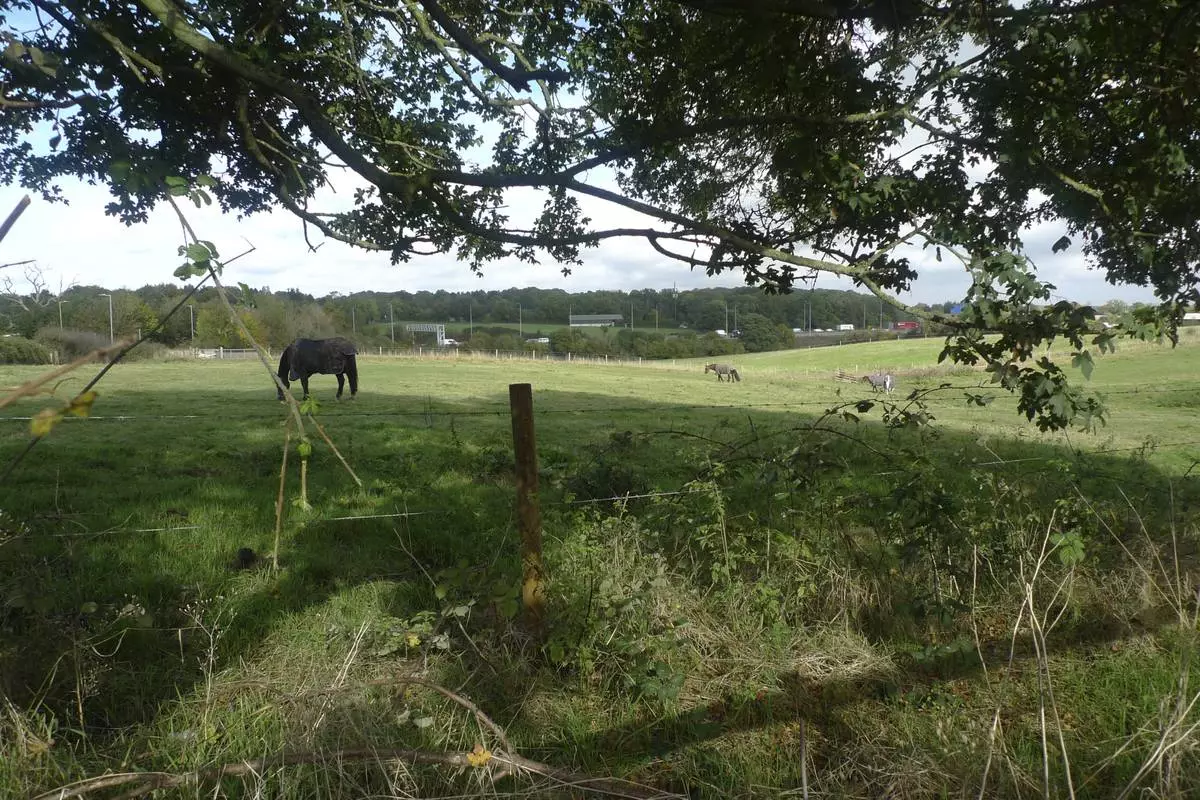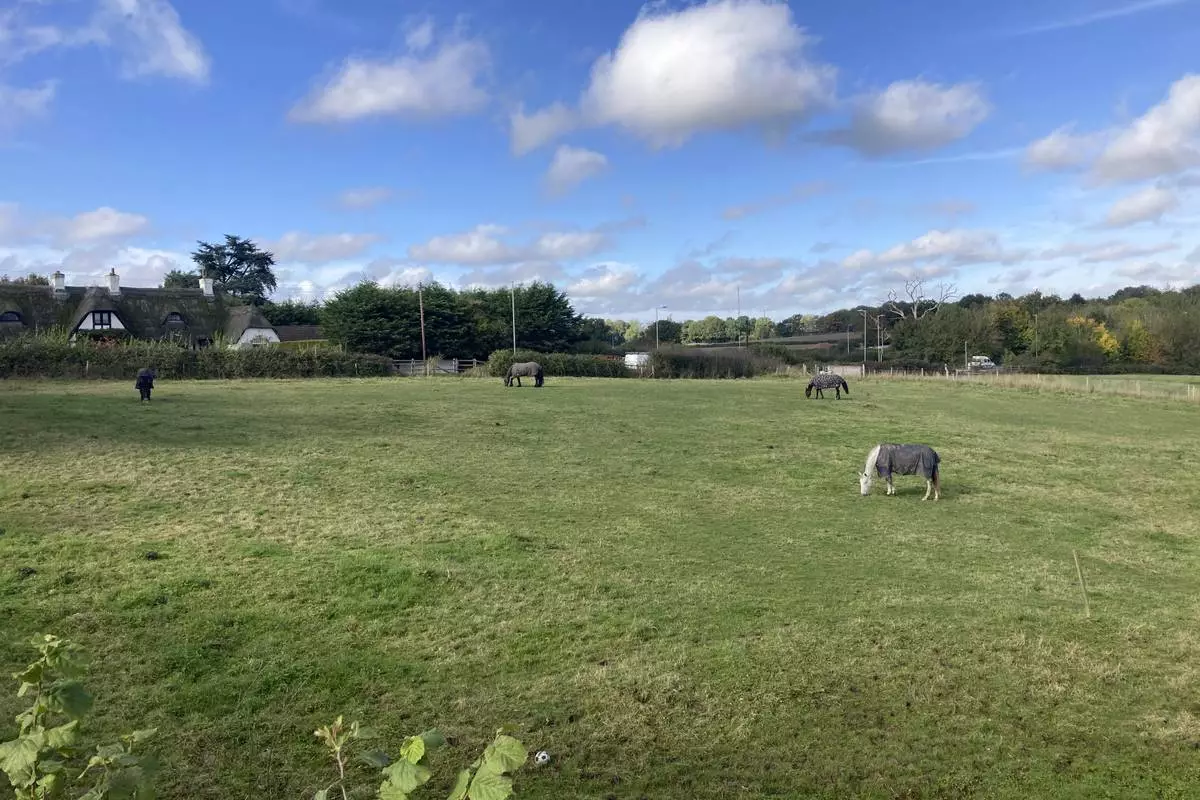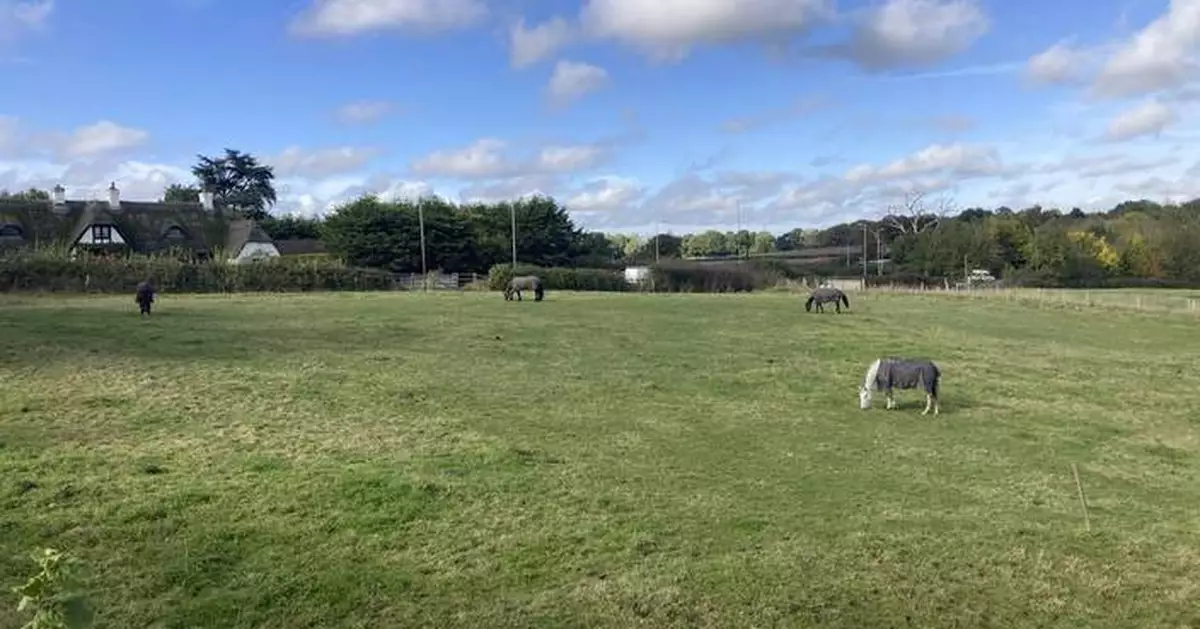ABBOTS LANGLEY, England (AP) — Originally built to store crops from peasant farmers, the Tithe Barn on the edge of the English village of Abbots Langley was converted into homes that preserve its centuries of history. Now, its residents are fighting to stop a development next door that represents the future.
A proposal to build a data center on a field across the road was rejected by local authorities amid fierce opposition from villagers. But it's getting a second chance from British Prime Minister Keir Starmer's government, which is pursuing reforms to boost economic growth following his Labour party's election victory in July.
Residents of Abbots Langley, 18 miles (30 kilometers) northwest of London, worry the facility will strain local resources and create noise and traffic that damages the character of the quiet village, which is home to just over 20,000 people. Off the main street there's a church with a stone tower built in the 12th century and, further down the road, a picturesque circular courtyard of rustic thatched-roof cottages that used to be a farm modeled on one built for French Queen Marie Antoinette.
“It’s just hideously inappropriate,” said Stewart Lewis, 70, who lives in one of the converted houses in the 600-year-old Tithe Barn. “I think any reasonable person anywhere would say, ‘Hang on, they want a data center? This isn’t the place for it.'”
As the artificial intelligence boom fuels demand for cloud-based computing from server farms around the world, such projects are pitting business considerations, national priorities and local interests against each other.
Britain's Deputy Prime Minister Angela Rayner has stepped in to review the appeals filed by developers of three data center projects after they were rejected by local authorities, taking the decision out of the hands of town planners. Those proposals include Abbots Langley and two projects in Buckinghamshire, which sits west of London. The first decision is expected by January.
The projects are controversial because the data centers would be built on “greenbelt” land, which has been set aside to prevent urbanization. Rayner wants to tap the greenbelt for development, saying much of it is low quality. One proposed Buckinghamshire project, for example, involves redeveloping an industrial park next to a busy highway.
“Whilst it’s officially greenbelt designated land, there isn’t anything ‘green’ about the site today,” said Stephen Beard, global head of data centers at Knight Frank, a property consultancy that’s working on the project.
“It’s actually an eyesore which is very prominent from the M25″ highway, he said.
Greystoke, the company behind the Abbots Langley center and a second Buckinghamshire project to be built on a former landfill, didn’t respond to requests for comment. In an online video for Abbots Langley, a company representative says, “We have carried out a comprehensive search for sites, and this one is the very best.” It doesn't specify which companies would possibly use the center.
The British government is making data centers a core element of its economic growth plans, deeming them “critical national infrastructure” to give businesses confidence to invest in them. Starmer has announced deals for new centers, including a 10 billion pound ($13 billion) investment from private equity firm Blackstone to build what will be Europe's biggest AI data center in northeast England.
The land for the Abbots Langley data center is currently used to graze horses. It's bordered on two other sides by a cluster of affordable housing and a highway.
Greystoke's plans to construct two large buildings totaling 84,000 square meters (904,00 square feet) and standing up to 20 meters (66 feet) tall have alarmed Lewis and other villagers, who worry that it will dwarf everything else nearby.
They also doubt Greystoke's promise that it will create up to 260 jobs.
“Everything will be automated, so they wouldn’t need people," said tech consultant Jennifer Stirrup, 51, who lives in the area.
Not everyone in the village is opposed.
Retiree Bryan Power says he would welcome the data center, believing it would benefit the area in a similar way as another big project on the other side of the village, the Warner Bros.' Studio Tour featuring a Harry Potter exhibition.
“It’ll bring some jobs, whatever. It’ll be good. Yeah. No problem. Because if it doesn’t come, it’ll go somewhere else,” said Power, 56.
One of the biggest concerns about data centers is their environmental impact, especially the huge amounts of electricity they need. Greystoke says the facility will draw 96 megawatts of “IT load." But James Felstead, director of a renewable energy company and Lewis’ neighbor, said the area’s power grid wouldn’t be able to handle so much extra demand.
It's a problem reflected across Europe, where data center power demand is expected to triple by the end of the decade, according to consulting firm McKinsey. While the AI-fueled data boom has prompted Google, Amazon and Microsoft to look to nuclear power as a source of clean energy, worries about their ecological footprint have already sparked tensions over data centers elsewhere.
Google was forced to halt plans in September for a $200 million data center in Chile’s capital, Santiago, after community complaints about its potential water and energy usage.
In Ireland, where many Silicon Valley companies have European headquarters, the grid operator has temporarily halted new data centers around Dublin until 2028 over worries they’re guzzling too much electricity.
A massive data center project in northern Virginia narrowly won county approval last year, amid heavy opposition from residents concerned about its environmental impact. Other places like Frankfurt, Amsterdam and Singapore have imposed various restrictions on data centers.
Public knowledge about the industry is still low but “people are realizing more that these data centers are quite problematic,” said Sebastian Lehuede, a lecturer in ethics, AI and society at King’s College London who studied the Google case in Chile.
As awareness grows about their environmental impact, Lehuede said, “I’m sure we will have more opposition from different communities."

James Felstead poses near his home in Abbots Langley, England, on Friday, Oct. 18, 2024. Plans to build a data center in a field on Abbots Langley's outskirts has pitted the national government's priorities against the interests of local villagers. (AP Photo/Peter Morgan)

The main road in Abbots Langley, England, is shown on Friday, Oct. 18, 2024. Plans to build a data center in a field on Abbots Langley's outskirts has pitted the national government's priorities against the interests of local villagers. (AP Photo/Peter Morgan)

Horses graze in a field on the outskirts of Abbots Langley, England, on Friday, Oct. 18, 2024. Plans to build a data center at the site has pitted the national government's priorities against the interests of local villagers. (AP Photo/Peter Morgan)

Stewart Lewis poses near his home in Abbots Langley, England, on Friday, Oct. 18, 2024. Plans to build a data center in a field on Abbots Langley's outskirts has pitted the national government's priorities against the interests of local villagers. (AP Photo/Peter Morgan)

Horses graze in a field on the outskirts of Abbots Langley, England, on Friday, Oct. 18, 2024. Plans to build a data center at the site has pitted the national government's priorities against the interests of local villagers. (AP Photo/Peter Morgan)


















